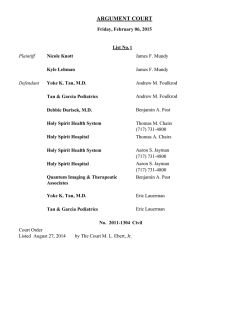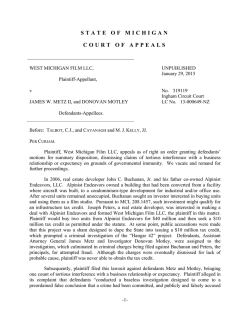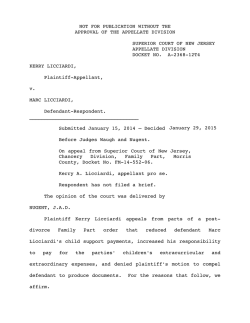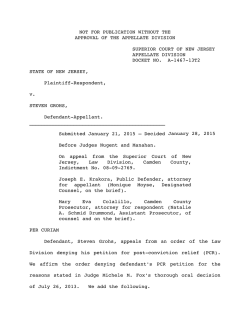
Summary Table - Samoa Law Reform Commission
This summary table is to be read in conjunction with Civil Procedure Rules Issues Paper Two Issue in Issues Paper Current Rules- Samoa Two Supreme Court (Civil Procedure Rules) of Samoa (SCR) & Magistrate Court Rules (MCR) NZ Reference Other Jurisdictions High Court Rules (HCR), District Court Rules (DCR), District Court Act (DCA), or other Commentary (further commentary detail contained in IP 2) 2.1 & 2.2 Parties SCR & MCR: no definition of ‘party’. District Courts Act (DCA): s 2 Definition A party is ‘every person served with notice of, or attending any proceeding other than as a witness or spectator, whether named as a party to that proceeding or not’. DCA: s 2 ‘party means any person who is a plaintiff or defendant in any proceeding; and includes any person added to the proceeding’. Uniform Civil Procedure Rules 2005 NSW (UCPR): r 7.11 A party is ‘a natural person who may commence and carry on proceedings in any court, either by a solicitor or in person’. Victoria – no specific definition. Some jurisdictions provide a definition of ‘party’ and some do not. The Samoan definition is somewhat ambiguous. 2.8 Joinder of Parties MCR: no rule for joinder of parties for several claims by the same plaintiff or defendant to be joined against a single defendant or plaintiff. But joined parties may be struck out. SCR: rr 31, 34 parties may be joined if arising out of same event, or a common question of law. MCR : no provisions SCR: r 43(1) where there is an issue related to the current cause of action, a defendant may add another person not joined as a defendant to the proceeding for HCR: r 4.29 joinder of parties where necessary for determination of the claim. All parties to be bound by judgment. County Court Rules VIC (CCR): r 9.06 joinder of parties where common question of fact or law or by leave of court. Civil Procedure Rules Vanuatu (CPR VAN): 33(1), (2) joinder by request of parties, other person or by court order. HCR NZ: rr 4.4m 4.7 a third Magistrates Court General party may be joined if issue is Civil Procedure Rules connected or similar as the (MCGCPR) VIC: r11.01 and subject matter or proceeding. CPR VAN: r 3.7 a third party may be joined if there is a claim of indemnity Some consideration is given in other jurisdictions to reasons and effect of joinder including fairness, expedience or delay. 2.23 Third party procedure 1 Third party procedures are useful in having all proceedings involving the same subject matter heard at the one time, thereby reducing the risk of inconsistent results where different proceedings are heard by example to claim a contribution. 2.37 Representation of parties 3.1 Representation of company or business 3.16 Representative proceedings (‘Class Actions’) MCR: r 14 & SCR: rr 37 - 41 persons of unsound mind and infants may be represented by appointed guardian. Includes term ‘mentally defective person’. Infants Ordinance 1961: infant means a person under 21, but inconsistent with Child Care Protection Bill 2013: child means a human being below the age of 18. MCR & SCR: limited provisions as to representation of companies. More detail provided in Companies Act 2011: s 345. contribution or relief. Mental Health Act NZ 1992: s2 the term has been changed to ‘mental disorder’. HCR NZ r 4.29- ‘minor’ is defined as a person under 18. Also ‘incapacitated person’ includes being of physical, intellectual or mental impairment. They are represented by a litigation guardian appointed by a judge. HCR NZ : r 6.12 service details provided in rules reflect same rules in Companies Act 1993. Firms and companies distinguished in Partnership Act 1975. Supreme Court (General Civil Procedure) Rules (SCGCPR) VIC: r 15(3) court may appoint a litigation guardian. UCPR NSW r 7.1 & SCGCPR VIC rr 1.17, 6.3: contain some provisions as to corporations as a party. Other provisions are contained in relevant Corporations legislation. MCR: r 11 & SCR: r 32 a HCR NZ: r 4.24 ‘Opt in’ Supreme Court Act 1986 representative may sue or be representative by consent of all (VIC): Part 4A ‘Opt out’ sued, with consent from any other plaintiffs or by court provisions: consent of other person to be a plaintiff (‘opt in’). order. plaintiffs not required but group members have the right to opt out before hearing. 2 different judges. Parties generally elect to adopt third party procedure in order to maximise consistent results and to reduce costs. New Zealand and Australia consider the ability of any guardian to best represent the interests of the minor. These jurisdictions also adopt neutral terms for incapacitated people. Legislative consistency is recommended in Samoa regarding the age of minors. Query whether provisions of Companies Act should be mirrored in MCR & SCR or whether better left to relevant Corporations legislation. Proceedings under ‘opt out’ system are quicker and easier to commence because consent of all plaintiffs not required. However a disadvantage is that members not wishing to be include must take a positive step to ‘opt out’ to avoid risk of being bound by an unfavourable ruling. 4 Pleadings HCR NZ: rr 2.10, 2.14 Statement of claim distinction from notice of claim. Clear requirements for response and ‘information capsules’ with defined obligations including timeframes of plaintiff and defendant. A prescribed form and detailed instructions are included in Rules. Also a party must provide at their own expense copies of all documents requested by the other party. Non compliance consequences include matter coming to an end or entry of judgment. SCGCPR VIC: r 13.02 guidelines as to all pleadings including order of pleadings, particulars, timeframes, alternative argument, relevant facts requirements but not evidence. UCPR 2005 NSW: r 14 provides similar detail as to pleadings including requirement for no evidence. Guidelines for parties may be useful in relation to pleadings other than only for statement of claim. 4.13 MCR: no provisions HCR NZ : r 7.77 pleadings Pleadings – Amendment SCR: provide for amendment of amended with leave of court of pleadings statement of claim with leave of court. SCGCPR VIC: r 36.04 one amendment of statement of claim without leave, with changes marked up for ease of identification. Consider the merits of allowing up to one amendment without leave of court rather than seeking leave each time, to save court time and cost. SCGCPR VIC: r 36.04 more comprehensive discovery both before proceedings commence, and during and after pleadings have closed. This enables early discovery of documents and to establish the identity of defendants, (including third parties) prior to commencement. Pre-issue discovery enables better formulation of claims and for discovery of documents that may have been in a party’s control, or that a party becomes aware of during proceedings. This may assist in resolution of matters prior to hearing. 5 Discovery MCR & SCR: only provide for statement of claim and general rules as to material facts, but no other procedural guidance in rules. MCR : no provisions SCR: r 86 Discovery after filing of defence. Non compliance with discovery orders consequences including dismissal or limitations to defence. District Court Rules (DCR) NZ: r 2.14.3 discovery included in ‘information capsule’ early but not prior to commencement of proceedings. HCR NZ: r 7.77 Court may order discovery before proceedings commence. Also, discovery obligations continue during proceedings. 3 5.16 Subpoena parties 6 Form of Documents to HCR NZ: rr 8.21, 9.52 SCGCPR VIC: r 32.07 non The requirement for non parties to production of documents party discovery on produce documents may assist in provisions for non parties. application to court. earlier identification of evidence and resolution. SCR: prescribed forms, but HCR NZ: Part 5, subpart 2 SCGCPR VIC: Order 27 Consistency of documentation may Court limited requirements as to form and content prescribed in detailed provisions as to assist in quality, ease of court format. rules. consistent form and content. handling and may reduce size, volume and cost of documentation. non MCR & SCR: no provisions 7.8 Trial - non appearance MCR: r 22, SCR r 117: proceeding may be struck out for non appearance by plaintiff unless affidavit filed. Judgment in default may be entered if non appearance by defendant. HCR NZ : rr 10.8, 10.9 if plaintiff fails to appear, the matter may be dismissed except for any counterclaim which must still be proven. If the defendant does not appear, the plaintiff must still prove the case insofar as the burden rests with the plaintiff. 7.21 Place of Trial MCR & SCR: no provisions as to HCR NZ: r 10.1 alternate venue where proceeding to be heard. with consent of parties where more convenient or fair. 4 CPR VAN: r 12.9 (2) if either plaintiff or defendant fail to appear, proceedings can be dismissed or judgment entered. UCPR NSW:r13.6(1) if plaintiff fails to appear, a second chance to appear is provided on an adjourned date before the matter is dismissed. The defendant must file notice of appearance, including consent to judgment. Rules differ slightly as to whether parties are given another opportunity to appear prior to dismissal or judgment. In some instances a trial has been held elsewhere in Samoa despite there being no rule as to place of trial. 8.9 Expert witnesses MCR & SCR: no provisions for HCR NZ: r 9.42 the court may expert witnesses. appoint expert witnesses, and parties’ right to call one expert witness to oppose court appointed expert. CPR VAN: r 11.2 expert testimony to be given 21 days prior to hearing. UCPR NSW: r 31.28 expert evidence by written expert report 28 days prior to hearing unless court orders otherwise. Also provision for expert conference and joint reports. SCGCPR VIC: r 40.03 expert evidence with expert code of conduct rules re independence 30 days prior to hearing. No expert witness provisions currently exist in Samoa, however rules in other jurisdictions demonstrate some concern about numbers of experts involved. Consideration to be given to code of conduct rules for experts. 8.11 Affidavits MCR: no procedural provisions HCR NZ: r 9.51 Affidavit or regarding swearing. agreed statement of facts to reduce areas of conflict. SCR: affidavits may be sworn Different service time before postmaster, collector of requirements by reference to customs or medical officer & time of agreement rather than others. No rules as to details of hearing date. jurat. Service 5 days before hearing. CPR Vanuatu: r 11 Affidavits to be served 21 days prior to hearing. Affidavit becomes evidence unless inadmissible, with right of cross examination. UCPR NSW: r 30.01 detailed rules. All evidence must be oral unless Court orders otherwise. Also use of sound recording, film etc. Different service time requirements, sometimes dependent on whether facts agreed or disputed (NZ), and by reference to hearing rather than time of agreement of facts. 5 8.16 Manner of giving evidence MCR: no specific provisions. HCR NZ: r 9.51 oral evidence SCR: r 61 evidence to be given unless court orders otherwise either verbally or by affidavit. or for interlocutory application. SCR: r 63 Notice to Admit within 3 or 5 days with costs consequences. 9. SCR: Part XI references by judges Reference for inquiry for inquiries or reports, with and report referee to have discovery powers of judge. No rules as to who may become a referee. 10. Reinstatement HCR NZ : r 29.12(2)(n) speedy determination of real questions including by referee. No specific guidance as to who may be a referee. CPR Vanuatu: r 12 witness testimony either oral or sworn statement, with right of cross examination. Sworn statements service 21 days prior to hearing date. SCGCPR VIC: r 40.02 oral evidence unless interlocutory application or originating motion ‘on the papers’. CPR Vanuatu: r 12.7 Limited guidance in Samoan SCR reference where complex and MCR as to who may be technical question to be appointed a referee. decided, with rules as to qualifications and experience of referee. UCPR NSW & SCCPR VIC: wide powers to appoint referees. SCR: r 139 reinstatement made HCR: rr 7.40 (3), 7.40 (4) No other jurisdiction used for by way of application (ex parte reinstatement made by way of comparison in the original motion). the judge’s own initiative or on drafted IP#2 application of a party. 6 Some evidence differences as to whether verbal or by affidavit. Different service time requirements. It appears that Samoa reinstates dismissed proceedings by ex parte motion. New Zealand has two options for reinstatement: a) by judge’s own initiative b) By application by the party (this is not restricted to exparte). 10.8 Setting Aside SCR: r 140 to set aside a judgment, order or any execution thereon in the absence of the defendant, a party can make an application to do so on the day the judgment was given. HCR: rr 10.9, 12.14 Judgment following non appearance any verdict or judgment obtained at the trial may be set aside by the Court on just terms or if there was a miscarriage of justice. New South Wales: Northey v Bega Valley Shire Council [2012] NSWCA 28mere absence of a party, of itself, is insufficient to justify setting aside an order. There must be some added factor that makes it unjust for the order to stand. In Samoa, an ex parte application can be made to set aside a judgment. There is no provision as to the basis for setting aside an order. In New Zealand the Court may set aside an order if considers just, or if it appears that there may have been a miscarriage of justice. New South Wales Judges adopt the same approach as New Zealand, reasoning that mere absence is insufficient to justify setting aside an order. 10.13 Rehearing SCR: r 141 the Court may order a rehearing if it considers reasonable, and stay proceedings to examine the application. Rehearing to be requested within 14 days of judgment, unless the Court considers the application could not have reasonably been made any sooner. HCR: r 20.18 Appeals are by way of Rehearing. r 2.3 Review of Decision by an Associate Judge. DCR: r 2.46 Review of Decision to Allocate Short Trial except for summary judgment, any decision may be reviewed and to allocate a short trial. UCPR NSW: r 20.12 the court must determine whether any rehearing should be a full or limited rehearing. New Zealand appears to provide a different approach to rehearing with any appeal being by way of rehearing. It is unclear as to the extent of an Associate Judge’s power to review or rehear. Further, in New Zealand, a party may apply for a review of a decision to allocate a short trial. 11.1 -11.19 Confession MCR: r 15 confession defences HCR: rr 15.15, 15.16 admission CPR VAN: r 4.5(1)general and counterclaim in default of cause of action and judgment provision of statement of the action. on admission of facts. case to include the statement of claim, defence, admissions and set offs. Consideration to be given to whether it is preferable for provisions to separate each step or to be more generic. 7 11.3 -11.19 Defence MCR: Part 3 & SCR r 96 HCR: r 15.17 admission of CPR VAN: r 4.5(2)general defendant to file defence within defence. provision of statement of the 10 days of service of summons. case to include the statement of claim, defence, admissions and set offs. MCR: r 15 & SCR: r 96 DCR: r 2.27.1 defendant files a UCPR 2002 Vanuatu: r 4.8 counterclaims to be served notice of counterclaim within counterclaim to be pleaded within 10 days of service of 30 working days after the with defence and set out summons. plaintiff’s notice of claim is details as if claim.SCGCPR served on the defendant. VIC: r 9 counterclaim to be pleaded with defence – court has discretion to order separate trial of counterclaim Consideration to be given to whether it is preferable for provisions to separate each step or be more generic. 11.21 Set Off SCR: r 108 ‘Any defendant may set off by way of defence any claim or demand that he may have in the capacity in which he issued against the plaintiff and in the same capacity that the plaintiff sues him.’ HCR: r 5.61 (1) restricts the right of a defendant to set off if the proceeding is against and/or filed by the Crown for the recovery of taxes, duties or penalties. Vanuatu general provision of statement of the case to include the statement of claim, defence, admissions and set offs. Consideration to be given to whether it is preferable for provisions to separate each step or be more generic. 12. Matters that resolve with Judgment Judgment on Confession SCR: r 98 a Judge may on the application of the plaintiff enter judgement on confession accordingly HCR: r 15.15 Judgment on No other jurisdiction used for Admission Of Facts if a party comparison in the original admits facts (in party’s drafted IP#2 pleadings or otherwise), any other party to the proceeding may make an application for any judgment upon those admissions…. the court may give any judgment or order on the application as it thinks just. Samoa and New Zealand differ on the rules in relation to who can apply for a judgment on confession (admission). Whereas Samoa states, that the plaintiff may enter judgment on confession, New Zealand allows for any other party to the proceeding to make application. 11.20 Counterclaim 8 No form or process guidance contained in SCR for counterclaim. 12.5 SCR: r 97 the plaintiff may apply Matters that resolve for judgment in default of with Judgment - Default defence, counterclaim, Judgment confession or payment into court within 10 days of summons. DCR: r 2.39 the plaintiff may seek judgment by default if response not served within time. Defendant may seek judgment by default on counterclaim if plaintiff response not served within time. HCR: rr 15.3, 15.4 Judgment may be sealed on proof of service of statement of claim by affidavit of service, or by affidavit verifying statement of claim. SCGCPR VIC rr 21.07 , 22.15Judgment by default. the Court has discretion to set aside or vary any judgment entered. SCR r 97 appears to mirror DCR NZ, except for the New Zealand pre-requisite of an affidavit of service of proceedings. 12.11 Summary Judgment No specific rule in SCR or MCR DCR: r 2.42, HCR: r 12.1 judgment may be entered against a defendant if the plaintiff satisfies the Court that the defendant has no defence. Similar provision exists for the defendant establishing that the plaintiff has no cause of action. SCGCPR VIC: r 22.02 mirrors New Zealand provisions for entry of judgment where no satisfactory claim or defence. Issue also discussed in IP 1 and in relation to amendment of DCA that this court be a court of summary jurisdiction. 13. Matters that resolve without judgment – delivery of chattels SCR: r 102 within 10 days of the summons, the defendant may deliver the property claimed or make whole or partial payment of the claim as compensation plus costs, prior to hearing. DCR: r 15.64 Warrant for No specific provision recovery of chattels after judgment for delivery of chattels, a plaintiff may seek a warrant for seizure of the chattels. 9 The Samoan rule does not provide for seizure warrants after judgment, but the New Zealand rules do not specifically provide for pre judgment delivery of chattels or money. This may be covered in New Zealand by settlement negotiations, payment into court and offers of compromise as per 13.3 below. These processes result in resolution prior to hearing and associated Orders. 13.1 Matters that resolve without judgment – payment into Court Without Denial of Liability. SCR: r 103 a defendant in an No specific provision action may at any time within seven days after service of the summons, inclusive of the day of service, pay moneys into Court. No specific provision This may provide a practical formula for a matter to be brought to an end without the need for a judgment or trial. 13.1 SCR: r 104 where the defendant No specific provision Acceptance of Monies pays into court part payment of paid into Court- the claim, with or without a Acceptance of Monies denial of liability and the plaintiff paid into Court accepts within 3 days, the proceedings will be stayed. No specific provision This is another practical form of resolution without the need for a judgment or trial. 13.3 Offer of Compromise & Calderbank Letters SCCPR VIC: r 26 contains provision for formal offers between parties, but not as to Calderbank offers (common law applies). Both mechanisms provide a real incentive for parties to make and accept offers of settlement. The offer of compromise has a costs consequence formula that applies where one party does not accept an offer which is greater than the final court order. The Calderbank offer is less formal but attracts the same costs penalties if it can be shown that it was unreasonably rejected. Both are designed to indemnify the legal costs of that party who wants to bring the matter to an end, but the other No specific rule appears in SCR DCR: r 4.10 & HCR: r 14.10 or MCR Written offers without prejudice except as to costs. a party may make a written offer at any time that is without prejudice save as to costs and relates to an issue in the proceedings. The court must not be made aware that any offer has been made. 10 rejects the offer that should have been accepted. 14 Discontinuance MCR: r 20 & SCR: rr 109, 110 the DCR: r 12.20 No other jurisdiction used for plaintiff may discontinue the HCR: r 15.19-15.25provide that comparison in the original proceeding prior to hearing. parties may discontinue drafted IP#2 proceeding, but the court may set discontinuance aside. Costs may be awarded. 15 Interpleader DCA: s 4 ‘Interpleader is ... a proceeding to determine the rights of claimants by which a person who is sued regarding some property or debt can require competing claimants to that property or debt to resolve their rights.1’ District Court Amendment Act 1992: s 12 jurisdiction increased from $1000 to $10,000. SCR r 159 Application affidavit in support required as to no ownership to the property, no collusion and court to decide on distribution of property. 16 Absconding Debtors MCR: r 26(1) & SCR: r 184 Arrest HCR: r 17.88 Restraint of Debtors Act WA Arrest of an absconding debtor in of absconding debtors Defendant may be arrested on & HCR AUS: r 11.02.3 Samoa not as broad as in New both these rules provide an ex parte application. protection of creditors and Zealand where ex parte 1Butt, Two provisions under SCR for discontinuance of an action either wholly or as to any cause of action. Further, discontinuance should not be used as a defence to bar subsequent proceedings. HCR: r 4.60 UCPR NSW: r 43.1 New Zealand Rules consistent with DCR: r 3.36 CPR Vanuatu: r 16.23 Rules in Samoa. similar interpleader provision Interpleader provisions to SCR. mirror NZ and SCR. P and Hamer David, 2011,, Lexis Nexis Concise Australian Legal Dictionary, Lexis Nexis Butterworth’s, Australia 11 17 General Provisions procedures for the arrest of debtors prior to final judgment where likelihood of defendant leaving Samoa and that the plaintiff would be prejudiced. The defendant is required to give security or face imprisonment. The defendant may apply to rescind or vary the order or to be discharged from custody, The court may make any order it considers just. arrest only where the defendant in contempt of court. Minimum amount of debt provided. SCR: Rule 4 the Rules shall be construed as to secure the just, speedy and inexpensive determination of any proceedings. HCR: r 1.2.3 (a) &(b) Rules to be construed to secure the just speedy and inexpensive determination Rules must be construed to avoid delay and expense. Civil Procedure Act 2010 VIC: ss 17-26 Legal Profession Act 2004 NSW: s 347 overarching obligations of parties to the Court as to reasonable prospects of claim’s success. Also paramount duty of parties to act honestly, not make frivolous claims or responses or without proper basis, not to mislead or deceive and to narrow issues in dispute and to take necessary steps to resolve. 12 applications and the defendant may apply to have order rescinded, varied or discharged from custody if the court considers just. WA does not provide for ex parte applications or provide defendants with a right to seek rescission or variation. Query consistency of Samoan provisions with Samoa’s obligations under International Covenant on Civil and Political Rights. Australia’s rules go further than Samoa’s insofar as additional obligations on parties to act honestly and to ensure that claims have a proper basis. This has the effect of avoiding waste of court resources and minimisation of costs.
© Copyright 2026






